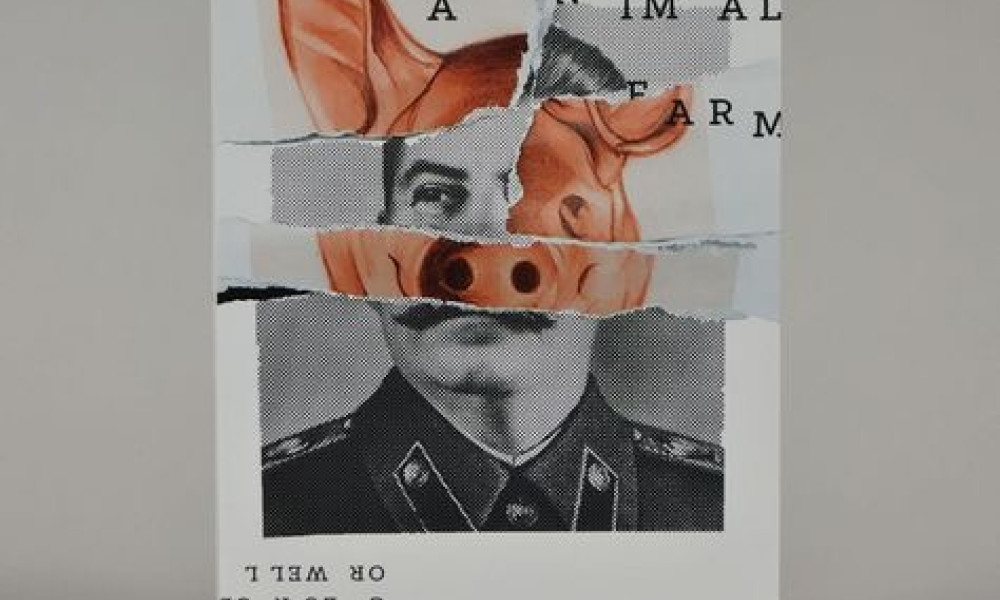Travel Tips
Lorem ipsum dolor sit amet, consectetur adipiscing elit.

By Arun Dahal Khatri
George Orwell's Animal Farm is a masterful allegory of the Russian Revolution, portraying how revolutionary ideals can be corrupted by power. The novella begins with Old Major, a wise boar and the visionary of the revolution, envisioning a utopia where all animals are free and equal. His vision, however, is shattered when he dies before witnessing the realization of his dream. In his absence, the pigs, representing the intellectual elite, take charge and introduce a new system, "Animalism," based on seven commandments that promise equality and justice. The overthrow of the human farmer, Mr. Jones, is the first victory for the animals. However, as Orwell intricately unravels, the true challenge lies in maintaining the values of the revolution.
Through the pigs' gradual ascent to power, Orwell mirrors the trajectory of the Russian Revolution. Napoleon, the tyrannical pig who symbolizes Joseph Stalin, manipulates the system, rewriting the commandments to serve his own ends. As the pigs grow more corrupt, they resemble the humans they initially overthrew, a transformation that underlines the novella's central theme of power corruption. The iconic alteration of the commandment from "All animals are equal" to "All animals are equal, but some animals are more equal than others" highlights the hypocrisy of authoritarian regimes. This striking contradiction reflects the dangers of unchecked power, where leaders betray their promises in pursuit of personal gain. Orwell's critique of totalitarianism extends beyond the confines of the Russian Revolution. In Animal Farm, the animals initially band together for the collective good, but the pigs, the self-proclaimed leaders, distort the truth. Squealer, aptly named for his manipulative ways, spreads propaganda to justify the pigs' increasing privileges. He uses fear, misinformation, and emotional appeals to keep the other animals subservient, much like how authoritarian regimes worldwide control and manipulate their citizens. One can see parallels to North Korea, where a small elite enjoys vast privileges while the rest of the population is indoctrinated and oppressed, constantly reminded that any dissent could lead to disaster.
The character of Boxer, the hardworking and loyal horse, embodies the tragedy of the working class. He dedicates his life to serving the Farm, adopting the mantra, "I will work harder," even as the pigs exploit him. His eventual fate—sold to the knacker when he is no longer helpful—reflects how oppressive regimes often discard loyal supporters when their utility runs out. Orwell's portrayal of Boxer is a stark reminder of how laborers are exploited in many real-world scenarios, from sweatshops in developing countries to corporations prioritizing profit over their workers' well-being.Orwell's satire does not spare those indifferent to the corruption around them. Benjamin, the cynical donkey, refuses to engage in the Farm's politics. His apathy allows the pigs to gain unchecked power, reflecting how indifference can be just as dangerous as active complicity. In modern times, this can be seen in political apathy, where citizens disengaged from the democratic process inadvertently allow corrupt leaders to thrive. What makes Animal Farm timeless is its relevance in contemporary politics. Orwell's sharp critique of how power-hungry elites can co-opt revolutions is a warning to any society. From populist movements to authoritarian governments, the novella serves as a cautionary tale of how the desire for equality and justice can be subverted when power is concentrated in the hands of a few. As Orwell brilliantly illustrates, without vigilance and accountability, the ideals of any movement can be twisted to serve the interests of the elite, leaving the masses disillusioned and oppressed.
In conclusion, Animal Farm is more than a reflection on a specific historical event—it is a universal commentary on the corrupting influence of power. Orwell's brilliant use of satire and allegory makes the book a compelling read that resonates just as strongly today as it did when it was first published. For readers who appreciate political satire and social commentary, Animal Farm offers profound insights into power dynamics, making it a must-read for all times.